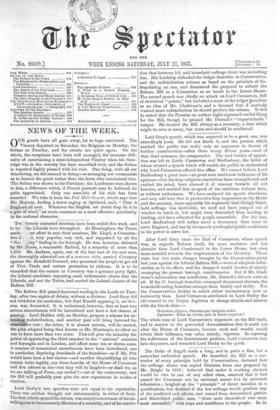After Lord Grey came the Earl of Carnarvon, whose speech
was, as regards Reform itself, far more moderate and less alarmist than Lord Cranborne's in the Lower House, but even more scornful towards the tergiversation of the Ministry. There- were but two main charges brought by the Conservative party last year against the Liberal Reform Bill,—wantof adequate infor- mation as to its effect, and the danger it would involve of utterly swamping the present borough constituencies. But if Mr. Glad- stone's information was insufficient, Mr. Disraeli's did not exist at all. If the 7/. borough franchise swamped the present electors, the household-rating franchise swamps them doubly and trebly. Yet the Conservatives decline to admit either inconsistency now or insincerity then. Lord Carnarvon attributed to Lord Derby the old counsel to the Trojan fugitives to change shields and armour with the Greek slain :— Mutemus elypeos, Danaumque insignia nobis
Aptemus: doing an virtue gills in hosts requirat?
The whole tone of Lord Carnarvon's argument on the Bill itself, and in answer to the pretended demonstration that it could 'not alter the House of Commons, because rank and wealth would retain their influence, was calm, stately, vigorous. In exposing the hollowness of the Government position, Lord Carnarvon rose into eloquence, and wounded Lord Derby to the quick.






























